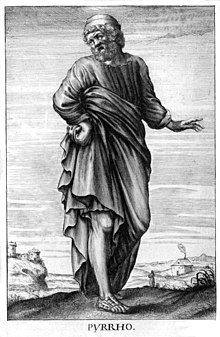Pyrrhonist
| Pyrrho | |
|---|---|
 |
|
| Born | c. 360 BC Elis, Greece |
| Died | c. 270 BC Elis, Greece |
| Era | Ancient philosophy |
| Region | Western Philosophy |
| School | Pyrrhonism |
|
Notable ideas
|
Skepticism |
|
Influences
|
|
Pyrrho (/ˈpɪroʊ/; Greek: Πύρρων Pyrrōn, c. 360 BC – c. 270 BC), was a Greek philosopher of Classical antiquity and is credited as being the first Greek skeptic philosopher.
Pyrrho was from Elis, on the Ionian Sea. Diogenes Laërtius, quoting from Apollodorus of Athens, says that Pyrrho was at first a painter, and that pictures by him were exhibited in the gymnasium at Elis. Later he was diverted to philosophy by the works of Democritus, and according to Diogenes Laertius became acquainted with the Megarian dialectic through Bryson, pupil of Stilpo.
Diogenes reports further that Pyrrho, along with Anaxarchus, travelled with Alexander the Great on his exploration of the East, 'so that he even went as far as the Gymnosophists in India and the Magi' in Persia. This exposure to Eastern philosophy seems to have inspired him to adopt a life of solitude; returning to Elis, he lived in poor circumstances, but was highly honored by the Elians and also by the Athenians, who conferred upon him the rights of citizenship.
Pyrrho wrote nothing. His doctrines were recorded in the writings of his pupil Timon of Phlius. Unfortunately these works are mostly lost. Today Pyrrho's ideas are known mainly through the book Outlines of Pyrrhonism written by Sextus Empiricus.
...
Wikipedia
